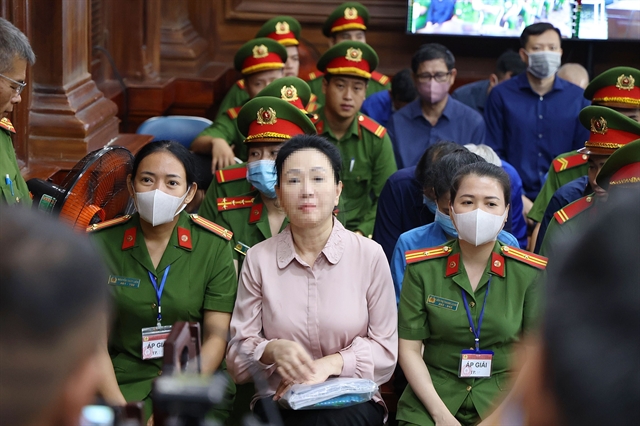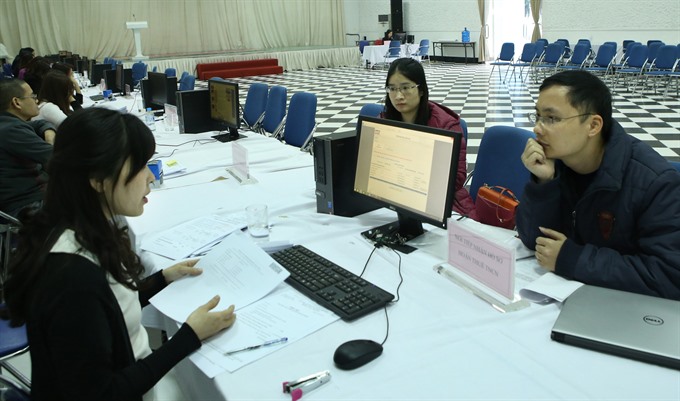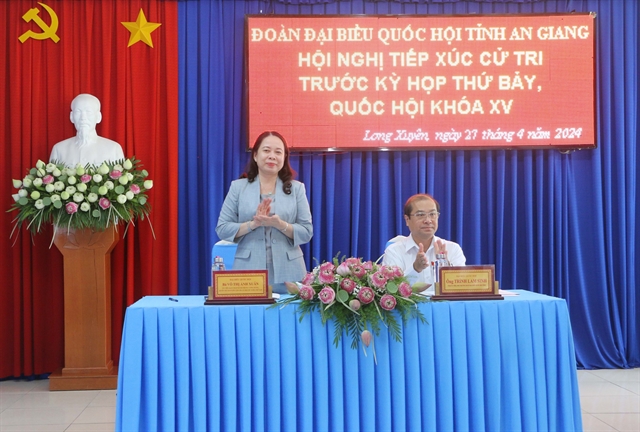 Economy
Economy

The Ministry of Finance (MoF) introduced a draft of amendments to laws on Value Added Tax, Special Consumption Tax, Corporate Income Tax, Personal Income Tax and Natural Resources Protection Tax at a press conference on Tuesday.
 |
| Tax payers at the Hà Nội Tax Department on Giảng Võ street, Hà Nội — VNA/VNS Photo Hoàng Hùng |
HÀ NỘI —The Ministry of Finance (MoF) introduced a draft of amendments to laws on Value Added Tax, Special Consumption Tax, Corporate Income Tax, Personal Income Tax and Natural Resources Protection Tax at a press conference on Tuesday.
Phạm Đình Thi, Director of the ministry’s Tax Policy Department, said at the conference that the amendments were needed to address difficulties that remained for tax paying businesses and individuals, ensure a coherent legal framework, and better deal with rising public debts.
He said that under adjustments made to the Law on Value Added Tax, there will be less goods and services entitled to the preferential level of five per cent VAT. The proposed amendments contain two options: increase the base VAT level from 10 per cent to 12 per cent from the beginning of 2019, or increase it to 12 per cent from 2019 and to 14 per cent from 2021.
Other changes include a regulation on businesses having the current level of 5 per cent VAT being reimbursed in full if they can prove that their input VAT amount (levied on input goods used for export) has yet to be completely deducted after 12 months or four quarters.
Under another change, VAT deduction for non cash payment with invoices is now inapplicable to purchases of less than VNĐ10 million (US$445) instead of the current VNĐ20 million ($890).
Amendments to the Special Consumption Tax (SCT) will incorporate soft drinks into the list of goods and services on which a 10 per cent SCT will be levied from 2019.
The SCT on tobacco-based products will rise to 75 per cent in 2019, from the current 70 per cent. Besides, a flat SCT of VNĐ1,000 ($0.04) per pack of 20 cigarettes and VNĐ1,500 ($0.06) per cigar will apply from January 1, 2020.
Trucks and semi trucks will be subjected to an SCT of 60 per cent of the SCT borne by passenger cars of the same horsepower. The SCT on passenger cars with less than nine seats will also be changed in order to comply with the national auto industry development strategy, but this was not specified.
Under changes to the Corporate Income Tax (CIT) Law, a 15 per cent CIT will apply to extra small businesses whose annual revenue is less than VNĐ3 billion ($133,690), whereas small and medium sized firms whose annual revenues range from $133,690 to VNĐ50 billion ($2.2 million will be subjected to a CIT of 17 per cent.
Other changes will also be considered in order to facilitate domestic businesses and encourage investment in manufacturing goods with high added value, in support industries and high quality services.
Tax adjustments will also seek to facilitate aid for remote areas with poor socioeconomic conditions, officials said at the press conference.
The latest adjustments are designed to accommodate some preferential policies issued recently by the NA in addition to the law on supporting small and medium-sized enterprises and the Law on Investment.
The laws on Natural Resources Protection Tax and Personal Income Tax will undergo minor changes to ensure compliance with existing regulations on electricity, customs clearance and natural resources, increase uniformity and reduce administrative problems for tax paying entities, the officials said.
Thi also said that despite the NA’s intention to amend the property tax, for the time being, no extra tax level will apply on second or more properties owned by an individual.
The income tax paid by lottery winners will be increased while it will be decreased for people with low personal incomes, he said, without specifying.
He said the changes were being made in accordance with the present national economic conditions in order to accommodate growth and global integration.
At the moment, Việt Nam has not followed most nations in the world in increasing its taxes. As many as 166 countries increased their taxes in 2016. In the EU, income tax increased to an average of around 21.5 per cent from 19 per cent in 2000.
Meanwhile, the average tax level rose to higher than 19 per cent in the Organisation for Economic Co-operation and Development (OECD) nations last year, and Asian countries like Japan or India followed suit.
Việt Nam’s neighbours like China, Cambodia and the Philippines have average tax levels of 17 per cent, 10 per cent and 15 per cent, respectively.
The Finance Ministry, therefore, considers the latest changes under the 10-year (2011-2020) National Tax System Reform Strategy as “reasonable” and in compliance with previously signed trade agreements.
The amendments are also based on previous tasks set by the National Assembly (NA) and the Politburo regarding the Tax System Reform Strategy via resolutions like 07-NQ/TW, 25/2016/QH14 or 35/NQ-CP.
Among other things, they are aimed at improving competitiveness and preventing losses to the State Budget via various forms of tax fraud including price transferring, Thi said.
He added that the MoF hopes to provide a sense of direction for both manufacturers and consumers, moving the business community towards better tax contributions through higher incomes and diversified production, depending less on preferential treatment from the State. — VNS









